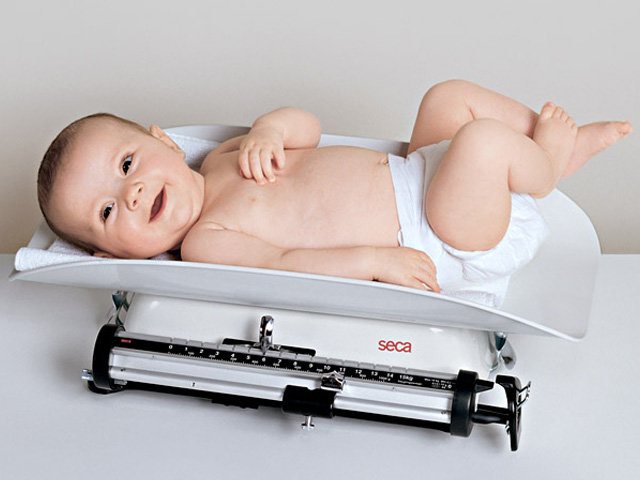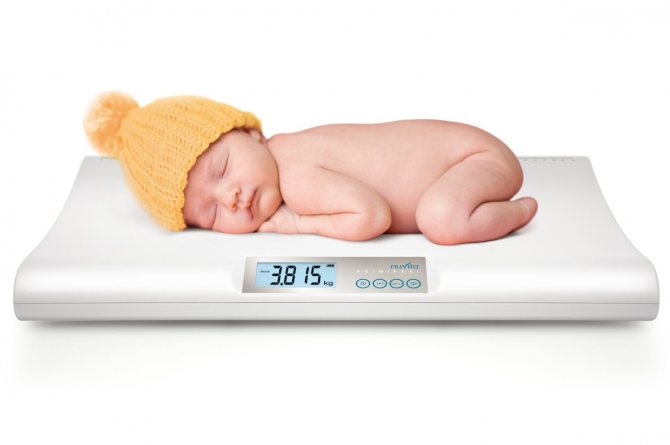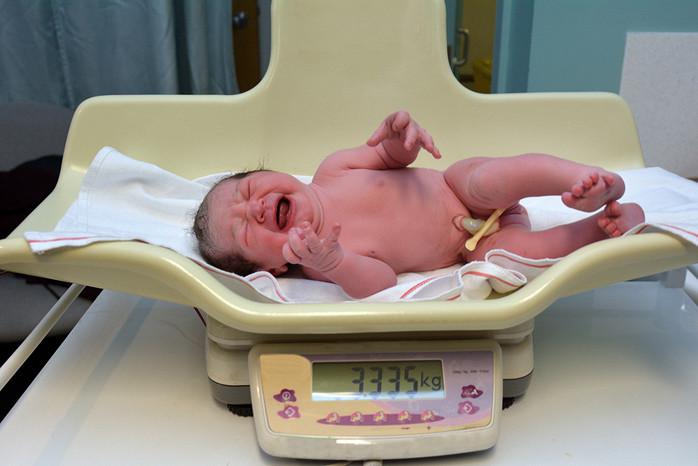23.09.2019 69890 0
- The importance of newborn baby weight gain
- Weight loss
- Reasons for subsequent poor weight gain
- Excessive weight gain
- How does a newborn’s weight increase by month?
- How pediatricians assess weight gain
- What to do if your child is not gaining enough weight
The fastest weight gain for a newborn occurs in the first three months - during this period, the child gains 25–30 g every day. Then daily weight gain slows down:
- 20–25 g per day – from the 3rd to the 6th month.
- 15–20 g – 6 to 9 months.
- 10–15 g – 9 to 12 months***.
Normal weight gain
Weight gain in newborns can vary significantly. This depends on the fat content of the mother’s milk, the diet of the mother and the newborn, and the hereditary physiology of the baby.
For infants who are fed on demand, the normal increase is up to one kilogram per month. The baby eats a lot, the milk comes in, the baby gains weight and develops plump folds on his arms and legs.
A similar process of weight gain is observed in those newborns whose mothers consume a lot of high-calorie animal foods (their milk contains more fatty carbohydrates and contributes to greater weight gain).
There are medical norms for weight gain in newborns. The gain (increase) is 20 grams per day. In total, the child gains 600 grams per month. A gain of less than 600 grams during the newborn period (in the first month of life) is regarded as insufficient. In this case, the pediatrician helps the mother adjust the feeding regimen and prescribes the necessary examination of the baby to find out the reasons: why is the child gaining weight poorly?
Features of gain in premature babies
Babies born between 28 and 38 weeks of pregnancy are considered premature if their weight is less than 2.5 kg and their height is less than 45 cm. Such babies differ in appearance from babies born at term:
- they have loose, wrinkled, inelastic skin;
Premature baby
- subcutaneous tissue is poorly developed or completely absent;
- the body is covered with primordial fluff;
- the head is larger in proportion to the body;
- nails are soft, thin, not fully formed.
These differences make it difficult to diagnose the correct development of a baby based on external signs (especially at first). Therefore, constant monitoring of body weight is mandatory. They compare not only the weight gain week by week, but also take into account the pace of development:
- by 2-3 months the newborn needs to double its weight;
- by six months - increase it 4 times from the initial figure.
If the baby develops normally mentally and physically, then by the age of one year, according to weight standards, he will catch up with full-term peers.
For this purpose, it is recommended to introduce complementary foods to breastfeeding prematurely born babies earlier than prescribed. If weight gain is poor, cottage cheese is added to the baby's menu (2-3% of the daily diet). It is recommended to alternate breastfeeding with formula milk. Complementary foods introduced from 5 months of age should be higher in calories than those that full-term babies receive.
Causes of underweight
Some of the most common reasons for poor weight gain include:
- He doesn’t eat enough because his mother doesn’t have enough milk. This reason can be diagnosed by the behavior of newborns: the baby actively sucks, but suddenly breaks away from the nipple, cries, attaches again, tries to pull the breast towards himself with his mouth;
- Sucks poorly (not actively) and gets tired quickly. Does not eat enough and gains little;
- There is dysbacteriosis, poor digestibility of milk and lack of weight;
- There is neurology, for example, underdevelopment of the facial muscles or their coordination, the result is that the child sucks poorly and difficultly;
- Another disease is present or feeding is improperly organized.
Underweight in a child is often observed when a strict feeding regime is observed without taking into account the psychological characteristics of the baby. For example, for a child who is nervous and whiny, inactive or weak, an increased feeding time is needed, instead of 15 minutes - 40 or 50 minutes.
The sucking movements of weakened newborns are slow, the baby gets tired and periodically rests, after which he begins to suck again. For such infants, it is impossible to set strict limits on the duration and interval between feedings. Otherwise, the baby will not eat enough and grow poorly.
Baby scales
If the child has problems and is not gaining weight well, it is worth purchasing (or renting) a monitoring device for home. There are several modifications of scales for newborns. Parents need to choose the option that is most suitable for them.
Types of scales
| Criteria | Mechanical | Electronic |
| Peculiarities | A traditional device made of metal coated with paint. It works on the principle of compressing springs using a weight and a measuring rod. Weight determination is carried out manually. More modern models are switch models. No manual intervention required, but the spring principle is the same | The body is made of light metal or environmentally friendly plastic. The stabilization system allows you to more accurately determine weight, even if the baby is restless. Thanks to electronic sensors, the weight is indicated on the display automatically. Many models have a memory unit that stores previous readings |
| pros | • durability; • no power required; • inexpensive | • error no more than 15 g; • lightweight and do not require special care; • wide choice in terms of design |
| Minuses | • periodic lubrication and cleaning are required; • heavy; • do not differ in design | • power supply is required (from the mains or batteries); • less durable compared to mechanical ones; • are expensive |

Time-tested models
Each category has its own advantages and disadvantages. If the exact weight of the baby is important, it is better to opt for electronics. If its price is beyond your means, there is a reason to rent such scales - rental will cost less than purchase. Although with a mechanical device you can control weight gain quite well.
Overview of scale models
| Brand | Max load, kg | Error, g. | Peculiarities | Orient. price, thousand rubles |
| Electronic | ||||
| Beurer BY80 | 50 | 5 | Operates on AA batteries. Equipped with an overload indicator. The bowl is not removable | 3,5 |
| LAICA MD6141 | Equipped with many different options. Multiple units of measurement available | 3,8-4,2 | ||
| Maman SBBC212 | 18 | Instead of a bowl, a platform is used that is convenient for the baby. The program is equipped with all the necessary options | 3,7-4,5 | |
| Mechanical | ||||
| Momert 7474 | 13 | 15 | Easy to use metal model. The scale is equipped with a magnifying glass | 2,0-2,5 |
| Seca 725 | 16 | 5 | Safe, comfortable, shockproof bowl. The scales are equipped with a zeroing function | 4,0 |
The table shows a conditional mini rating of devices for weighing newborns. Parents may come across other models, so you need to learn to prioritize when choosing them.
Dysbacteriosis
Underweight in a newborn may be associated with illness. For example, a child has dysbiosis, he eats a lot, but the milk is not digested (there are not enough bacteria in the intestines that process and break down milk food). In this case, the baby can be active while awake, calm during sleep, and suck normally. Sometimes, the only criteria indicating dysbiosis are frequent bowel movements (up to 8-10 times a day) and underweight of the child.
The reasons for the development of dysbiosis in infants often lie in the antibiotic treatment performed. Such medicinal effects can be carried out in the maternity hospital for certain indications. The result of the treatment will be intestinal dysbiosis in a newborn child.
How to weigh a child correctly
Knowing how much weight a newborn should gain by month, and having the appropriate device at home, it is easier for the mother to track the dynamics. The scales must be accompanied by instructions for use. The following recommendations are also important:
- the scales are installed on a flat surface;
- lay the diaper and only then turn on the electronic device or set zero on a mechanical device;
- the baby is stripped naked and carefully placed on the scales.

Weighing a toddler
If the little one is too mobile, then it makes more sense to purchase an electronic model. It has an option that records the average weight.
Control weighing helps the mother understand whether the child is gaining enough weight. The main thing is that the shortage does not cause you to worry, because one day the baby was active, the next he behaved calmly. You should panic when there is no weight gain for a long period.
How to weigh your baby at home?
If a newborn baby does not eat well or there is insufficient weight gain, you can carry out a control weighing of the amount of milk consumed. To do this, the baby must be weighed before and after feeding. Since special baby scales are often not available at home, you can use home bathroom scales. Before feeding, dad stands on the scale with the baby in his arms (the measurement accuracy should be quite high; it is better if the scales are electronic and give the mass value accurate to tens of grams). After feeding, dad re-measures the total weight (his and the baby). The difference in the obtained values will be equal to the mass of milk consumed.
Baby's weight at discharge
Clothes sizes for newborns
The starting indicator for monitoring body weight is not the one that was at birth: the weighing figures at discharge are taken into account. All children lose weight in the first week, this is due to the natural characteristics of the body.

First weigh-in
If, for example, the baby weighed 3.5 kg at birth, then when sent home this figure will be 200-500 g less. Mom should not worry about this - with a balanced diet, the little one will very quickly gain the necessary kilograms.
When does weight gain begin?
Weight gain for infants begins 7–10 days after birth. The normal weight of a newborn ranges from 2 kg 500 g to 4 kg. During the first week, the baby loses a little weight. This loss is considered physiological and normal. The rate of weight loss for a newborn during the first days is 5–7%. A loss of more than 8% is considered pathological. The reasons for physiological weight loss are as follows:
- Exit from the intestines of meconium (intrauterine feces);
- The initial period of the newborn is accompanied by constant sleep of the baby. During the first days he adapts to new living conditions and experiences stress;
- Physiological loss of fluid (with breathing).
At the end of the first newborn period, the baby’s eye lens changes (physiological clouding disappears), he shows interest in his surroundings, and becomes active. On the fourth or fifth day after birth, colostrum in the mother’s breast is replaced by full breast milk. The baby is actively eating and gaining weight. The daily weight gain of a newborn baby is formed - from 20 to 30 grams per day.
By four months, active growth decreases. The child moves a lot and sleeps less. The rate of weight gain decreases.
Why watch your weight gain?
Nutrition is the main physiological need of the body. Its importance is especially important in the first year of life, when the child must receive the substances necessary for the formation of hormones, enzymes, and improvement of internal systems. The value of food is that it helps in the construction of tissues and cells, as well as their renewal.
The more complete the nutrition, the stronger the baby’s health, the better his resistance to harmful factors. Not only physical, but also mental development directly depends on the quality of food consumed.
During the first six months, a child requires a large amount of valuable substances to cover the energy costs used for adaptation, intensive growth, maintenance of vital functions, and metabolic processes.
Important! Lack or excess of nutrition leads to physical and mental disorders in the development of the baby. Natural and acquired immunity is weakened. The activity of organs providing homeostasis is disrupted.
To avoid the development of nervous and endocrine pathologies, allergies, diseases of the digestive and cardiovascular systems, it is necessary to monitor the rate of infant weight gain by month. The mother performs this function regularly, starting from the first days of the baby’s appearance in the house.
Table of weight gain norms up to one year
However, it must be borne in mind that most medical tables were compiled about 30 years ago. After changes regarding feeding and handling of the baby (they were introduced to replace the old maternity hospital rules), this table is more suitable for calculating the weight gain of artificial children.
Breastfed babies gain differently. On average, 800 - 1000 grams per month during the first three months and 600 - 800 grams in the next three.
Further, the rate of weight gain decreases to 500-600 monthly grams (up to a year). As a result, a one-year-old baby often weighs 11–12 kg.
How to choose a scale for newborns
For a successful purchase, you should pay attention not only to the beautiful design. Devices are evaluated according to other criteria.
Characteristics of scales for newborns
| Criterion | Peculiarities |
| Bowl size and shape | The larger the parameter, the more convenient it is to weigh the child. The toddler must fit completely on the scale |
| Platform type | It is recommended to choose not a monolithic one, but a collapsible one. This makes it easier to transport the device and care for it |
| Material | Metal models are heavier than plastic ones. It is necessary to ensure that the lightweight material does not contain harmful impurities |
| Permissible load | If you buy a device with a reserve for subsequent years, then it is better to choose models designed for a load of up to 50 kg. They have a removable bowl that allows you to turn a bench scale into a floor scale |
| Error | The indicator should be minimal so that the baby’s weight can be determined with greater accuracy |
Electronic devices may have additional functions built in, this affects the cost. Therefore, when giving preference to such models, you need to think about how important the available options are.
Weight loss in the first days
Knowing the birth weight, parents should not be afraid that after a short time, within two or three days (or maybe five), the child’s body weight suddenly becomes smaller. Doctors explain that there is a transient (physiological) loss of mass. This is a natural reaction of a fragile body, and during this process the intestines are freed from meconium, that is, original feces, and a significant loss of water occurs simultaneously with breathing and sweating.
There are still some reasons that cause this phenomenon, but so far scientists have not come to a consensus about what causes them. But the main thing is that this event does not negatively affect children's health.
Mom should not try to stop this natural process, trying to saturate the child as much as possible. Force feeding will do nothing, and if the baby is healthy, he will still lose about 5 to 8 percent of his body weight.
The most noticeable weight loss is observed in:
- children weighing over 4500 g;
- firstborns;
- newborns who have gone through a difficult, long labor during which pathologies occurred.











